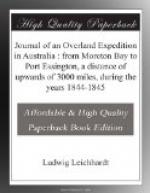Large fish betrayed their presence in the deep water by splashing during the night: and Charley asserted that he had seen the tracks of a crocodile. Swarms of whistling ducks occupied the large ponds in the creek: but our shot was all used, and the small iron-pebbles which were used as a substitute, were not heavy enough to kill even a duck. Some balls, however, were still left, but these we kept for occasions of urgent necessity.
Nov. 22.—As our meat was not sufficiently dry for packing we remained here the whole of this day; but, at night, the heaviest thunder-storm we perhaps had ever experienced, poured down and again wetted it; we succeeded, however, notwithstanding this interruption, in drying it without much taint; but its soft state enabled the maggots to nestle in it; and the rain to which it had been exposed, rendered it very insipid.
Poor Redmond, the last of our bullocks, came frequently to the spot where his late companion had been killed; but finding that he was gone, he returned to his abundant feed, and when I loaded him to continue our journey down the river he was full and sleek. It was interesting to observe how the bullocks on all previous occasions, almost invariably took cognizance of the place where one of their number had been killed. They would visit it either during the night or the next day, walk round the spot, lift their tails, snuff the air with an occasional shake of their horns, and sometimes, set off in a gallop.
Nov. 23.—We travelled about eight miles north-west over an equally fine country. A high range of Pegmatite descended from the table land far into the valley, from east to west; and an isolated peak was seen to the west of it at the left bank of the river.
The Eugenia with scarlet fruit, and another species with rose-coloured fruit, of most exquisite taste—particularly when the seed was abortive, and the pericarp more developed—were abundant on the flats of the river; and Aemena?, with smaller fruit and thin acidulous rind, grew straggling on the ridges.




